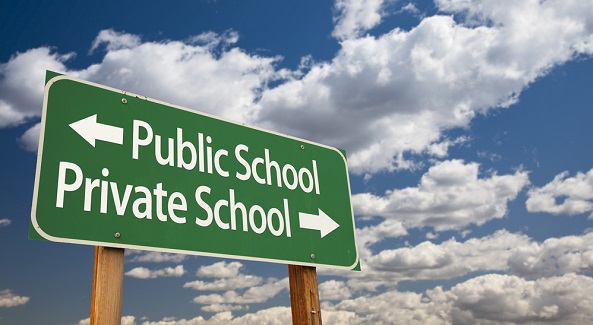Private Colleges vs. Public Colleges: What’s Better for You?

When it comes time to apply to colleges, choosing between a private vs. public school is a major decision. The biggest difference between a private and public college is that private colleges are not operated by governments, and may be non-profit or for-profit institutions. Public colleges are funded by state governments, and therefore are traditionally less expensive due to the in-state student, and also their parents, paying taxes to subsidize the university.
For more information on what the difference is between public and private schools, take a look at the breakdown below.
The Benefits of Public Colleges
Public schools, especially those for in-state students, offer a smaller price tag than most private schools. If you’re looking for the pros and cons of public vs. private schools, the price tag for public schools is by far one of the biggest draws, with public schools costing on average $8,000 less per year than private schools, according to Business Insider. In addition, with larger classroom sizes and altogether bigger class bodies, public schools offer a wider variety of extracurricular activities and athletics.
According to an article in The New York Times, those who have gone to public institutions have had more positive experiences fitting in on campus, with Student Services providing not only a list of scholarships available to the student, but a stronger and more clear path toward graduation. While private schools have generally smaller class sizes, the article states that students interviewed attending public universities have had a fuller college experience than those attending private universities.
The Benefits of Private Colleges
While private colleges are more expensive than their public counterparts, smaller class sizes are a draw for many students. In the same The New York Times article mentioned previously, though many students had to work during school in order to afford their tuition, the smaller class sizes and perceived quality of education led them to feel it was worth the investment.
Topping off many parents’ list of concerns is the question of campus safety. In the same article, there were no complaints about the safety between public vs. private schools, but with small-town-feeling campuses, private schools offer a more relaxed environment in which to study.
In a recent Time article, the author assesses claims that private school provides a higher level of developed abilities. In standardized testing, students attending private schools showed a significant margin of success above their public school counterparts, and in a John Carroll University study, the graduation rates between private colleges vs. public colleges showed a clear advantage toward private.
If you are interested in learning more about specific schools, please check out our school database center on Career Glider. There you can get in-depth information about hundreds of schools including Liberty University, the nations largest non-profit, private university.
What Else Should Students Consider Before Choosing a Public vs. Private School?
Beyond the price difference, there are many other things to consider before deciding on your college. Take a careful look at what programs the school offers. While you may have decided on your major already, many students change majors mid-way through their college life, and the more diverse your chosen college’s set of degree programs, the more likely you are to discover a program that you feel passionate about.
Do your research into the schools you’re applying to and ask yourself the following questions:
- What kind of reputation does the school have?
- How likely is this school to help prepare me for a job?
- What is the quality of the teachers employed by the school?
In deciding between public vs. private school, the decision of what type of institution you attend is essential, but isn’t the only important question. Always do your research: graduating a degree program is often a four or more year commitment. Ensure that the institution is one you’d be proud to graduate from, and will give you the biggest benefit for your dollar.



Add a comment